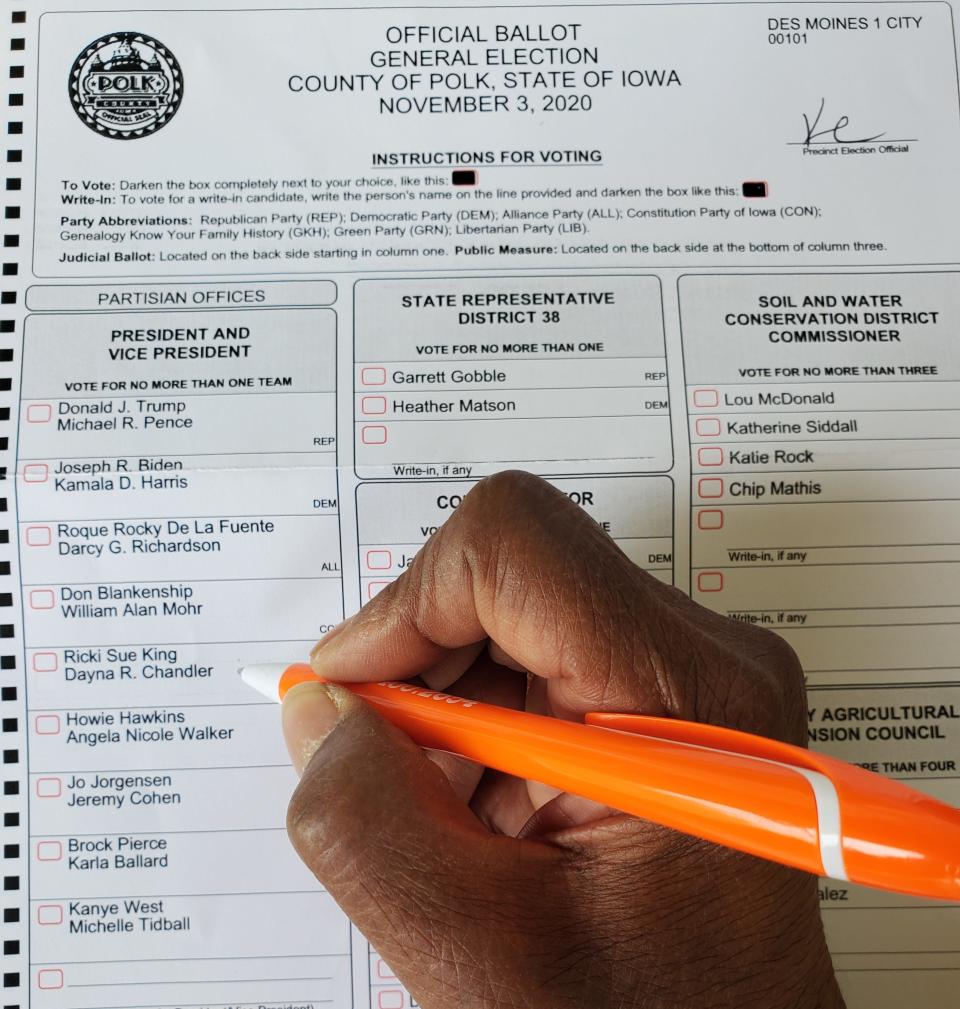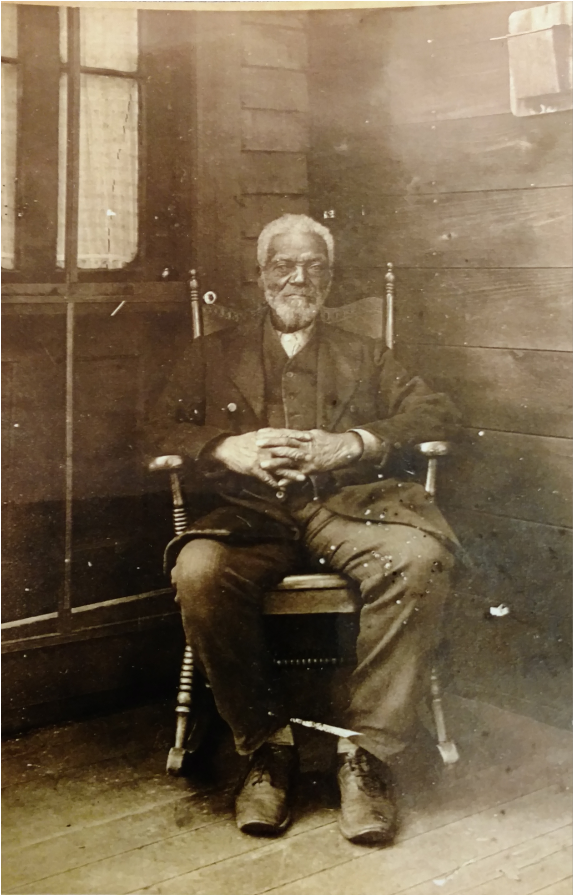Opinion: Ricki King wants everyone to know Black people and history are in Iowa. I do, too.
When I lived in San Francisco, I never thought of Iowa as a flyover state. It was worse — I never thought of Iowa at all. It just wasn't a state I'd been to or through. In 2001, when I visited Iowa for the first time, I didn't think there were (m)any Black people here. Before I began researching the diverse mining town of Buxton in 2008, it didn't occur to me there was Black history here.
Since moving to Iowa in 2014, I continue to learn just how wrong I was. And I like how Ricki King, forensic genealogist, historian and founder of Roots to Branches Genealogy, is showing others how wrong they are, too.
The time King ran for president, in 2020
King loves history, and in 2020, when she ran for president, she made history. She said she became the first Black woman from Iowa to be on the Iowa ballot as a presidential candidate (or first Black person, if you don't count George Edwin Taylor, who was left off the ballot).
It wasn’t planned. It happened because of her brother. “He was posting on Facebook, ‘if one more doggone Democrat runs for president, I’m going to run for president,” King said. “Well, since I was out drinking, I was like, ‘I have to out-do my brother, Karey. I’m going to go tomorrow and run for president.’”
More by Rachelle: Opinion: A musical about the all-Black female Army unit, the 6888th, is in development. Will Iowa be in it?
And she did. She filed the paperwork, creating her own party, because to run as a Democrat or Republican would have taken getting party endorsement and caucusing. “I’m interested in history. This will get people thinking I want to make history, so I named it Genealogy Know Your Family History," she said. She also hoped the name would inspire people to do just as the words suggested.
King and her friend Jim Cooper knocked on doors in Beaverdale and walked up to strangers in the skywalk and at festivals on weekends for several months to get the required 1,500 signatures in 10 counties.

They got them. Her name and her party, GKH, appeared on the 2020 ballot. She and her vice president, her cousin Dayna R. Chandler, made history. Their motto was "Redefining The Win. Anything is possible. Our ticket is proof. Now go vote — just not for me.” Despite her urging, 500 or so people voted for her — those who couldn’t bring themselves to vote for Joe Biden or Donald Trump.
King didn't do this as a joke. She did it because she wanted to inspire people to follow their dreams and not sell themselves short because they don't think they'll succeed. "Kids always say they are going to be president one day," King said. "I wanted to show them that anyone can run for president."
More by Rachelle: Opinion: A Ukrainian mother shares her story of fleeing war — and how an Iowa family stepped up to help
She also wanted to show the nation that there are Black people in Iowa both by being a candidate and by speaking. King remembers Gayle King asking why, when the media visits Iowa, they never interview any Black people about their politics. "I'm like," said Ricki King, "'Gosh, you know, she's right."
But even though Ricki King was running, the national media ignored her. "I'm doing this and I can't get them to even put me on to say, you know, even as a joke, 'Hey, there's this girl here that thinks she's just making history running for president.'"
It was a great accomplishment, and making history in this way is something King's proud of.
Recent projects show there are Black people in Iowa
Network to Freedom: On June 18, Des Moines Mayor Frank Cownie recognized the addition of Woodland Cemetery to the National Park Service’s National Underground Railroad Network to Freedom in a brief celebration at the cemetery. Fifteen verified underground railroad operatives and freedom seekers are buried there, and another four or so are on the contingent list, waiting to be verified.
More by Rachelle: Opinion: Can Waterloo's new grocery store model work for Buffalo after racist massacre?
The effort to get Woodland on the Freedom Network was started by the Forever Free Project, founded in 2009 by Barry Jurgensen. The project's focus includes nominating sites related to the history of the Underground Railroad.
Jurgensen asked King to help him after she contacted him for research involving another Freedom Network site.

So King joined the West Des Moines Historical Society's team. The historical society administered the mentoring program and King led it, reviewing interns’ research, helping them with paperwork, and working on the genealogy part to find living descendants. She found some, such as distant cousins of Delia Webster, who, according to the cemetery's Network to Freedom application, was a well-known abolitionist, conductor and first woman to be imprisoned for her involvement in the railroad. Some of the relatives flew in from Seattle to attend the June 18 event.
They weren’t the first group to work on the project, but they were the ones to finish it. King feels proud of their — and her — part in its completion. Now, she wants everyone to come out, scan the QR codes, and learn about these Black (and white) people in Iowa — the conductors and the freedom seekers.
Black Heritage Survey in Dubuque: In February 2022, the Dubuque Historic Preservation Committee launched a year-long Black Heritage Survey to show Black people lived in Dubuque long before 1950. According to King, they’re looking for houses that Black people lived in to preserve under the National Register of Historic Places. "We're hoping to have pictures of people who lived there, show their family history,” King said. They’re also researching housing covenants that prevented Black people from living in certain areas. This, and more, will be saved in a database.
According to the group's press announcement, the survey will discover the history related to families, people, events, trends and places of Black Dubuquers from 1830 to 1980 and will include an online story map to allow the public to explore the places, people, events and findings of the research.
More by Rachelle: Opinion: One donor body can save hundreds of lives (with the help of an organ harvester)
King as well as Pearson Consulting are the subcontractors working on the project. Of course King will be focusing on genealogy. "I'm looking for at least 10 families that we can find some kind of interesting stories," King said.
It's another project that fits into King’s bigger goal of showing that the prevalence of Black people in Iowa.
I applaud King for having the courage to run for president to send a positive message and for the work she and all on these projects are doing to further the history of Black people and inform others that, yes, there were and are Black people in Iowa.
Learn more
For more information about Ricki King, visit rootstobranchesgenealogy.com. To help identify Black families in Dubuque (or to just read interesting stories), visit facebook.com/DubuquesBlackHeritage.
Rachelle Chase is an opinion columnist at the Des Moines Register. Follow her at facebook.com/rachelle.chase.author or on Twitter @Rachelle_Chase.
This article originally appeared on Des Moines Register: Opinion: Ricki King ran for president to inspire Black people in Iowa

